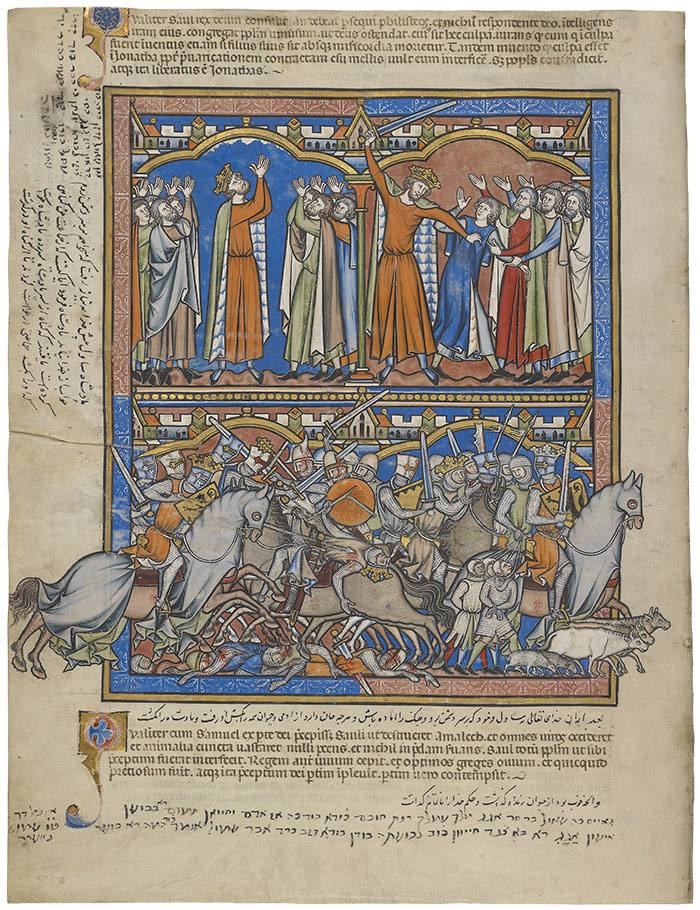
Unbalanced by Rage, A Royal Insubordinate
Old Testament Miniatures with Latin, Persian, and Judeo-Persian inscriptions
Purchased by J.P. Morgan (1867–1943) in 1916
Unbalanced by Rage
Frustrated by the prolonged battle with the Philistines, Saul seeks the counsel of the Lord, who does not reply. The king discovers that Jonathan has eaten during the battle and wrongly deduces that this act offended the Lord. Saul resolves to kill Jonathan, but the Israelites deliver the youth from his father's misguided vengeance. (1 Kings 14:37–45)
A Royal Insubordinate
Afterwards, the Lord orders Saul, through Samuel, to destroy the Amalekites, stating that neither man nor beast is to be spared. In battle, Saul violently unhorses the Amalekite king Agag, but, contrary to the will of the Lord, takes Agag and his soldiers captive and collects the best of the enemy's cattle. (1 Kings 15:2–9)
Folio 24v (Latin)
Upper half: How king Saul consulted God, asking if he ought to pursue the Philistines. But God did not answer him and thus, aware of his anger, he called together all the people, that God may show whose fault it was, swearing that whoever was to blame, even his very own son, would surely die. When, at length, the fault had been found to be Jonathan’s due to the transgression of eating the honey, he wants to kill him. Still, the people speak against it and Jonathan is released. (I Samuel 14: 37–45)
Lower half: How, when Samuel had ordered Saul, in the name of God, to destroy Amalek, to slay all the men, and to kill their animals, sparing none and keeping no booty, Saul killed all the people, as he had been ordered. Yet, he took the king alive, as well as some excellent flocks of sheep and whatever valuable there was, and thus he partly followed God’s command, but partly disrespected it. (I Samuel 15: 1–9)
Folio 24v (Persian)
Persian foliation: 20
Upper left margin: King Saul sought council before God [saying], "I want to attack the enemy." No response came from God. The king said, "Who amongst my people has sinned?" They discovered that the king’s son had sinned. The king intended to kill him. Some people pleaded with him till he forgave his sin.
Lower half: After that, God the Exalted commanded Saul, "Attack the enemy; and prepare for war, and slay all the living. Kill all, from human and animal." He went and slew the king and spared what was good amongst the animals and did not complete God’s command.
Folio 24v (Judeo-Persian)
Upper left margin, corner: When Saul had commanded that on this day of war no one should eat anything, Jonathan was unaware [of this]; he ate a [small] amount of honey, as it is written in [chapter] 14 of Samuel.
Lower half, beneath Latin: Here it is that Saul went up against Agag, king of the Amalekites. It was God’s command that they kill all the Amalekites and their animals, but they did not kill Agag and some goodly animals [and] God became angry. In the end Samuel himself killed them all. This is related in Samuel [chapter] 15.
Content consultant: Richard Leson
Persian translated by Sussan Babaie
Judeo-Persian translated by Vera Basch Moreen
Latin translation by Eran Lupu
After the commentary volume accompanying the Fine Art Facsimile edition by Faksimile Verlag Luzern
